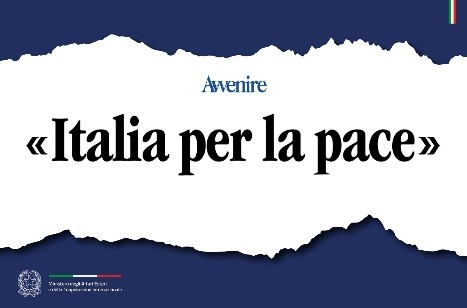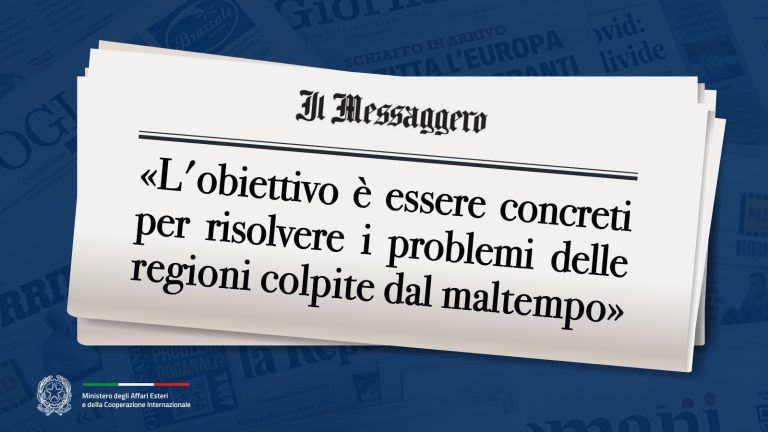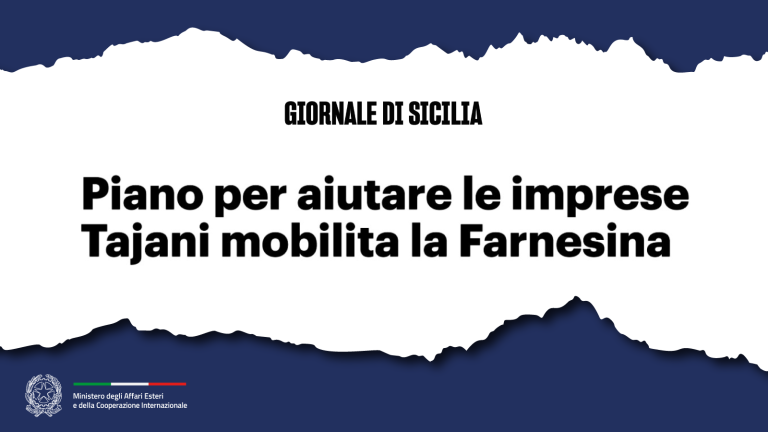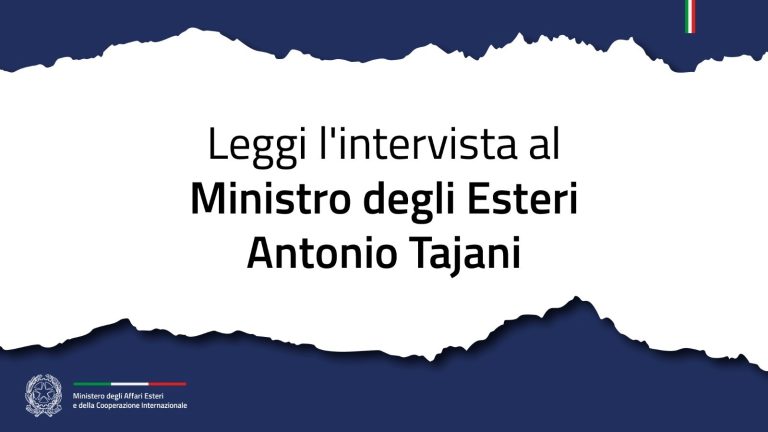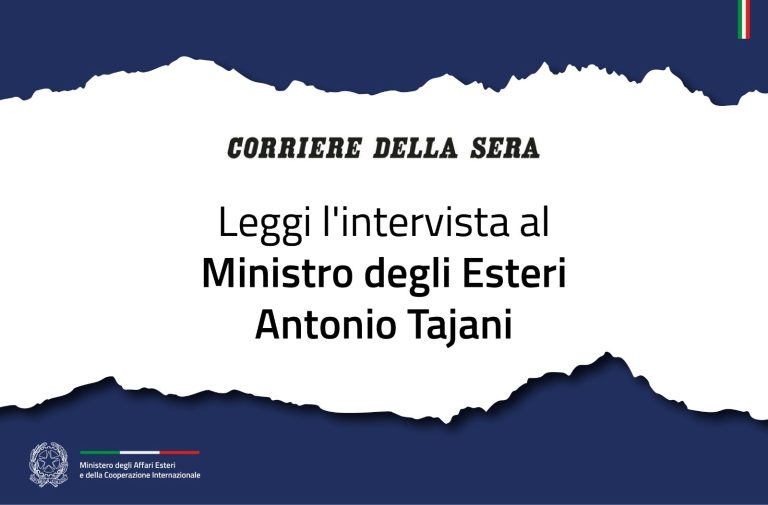“The Italian government is paying great attention to the Holy See’s attempt to encourage the launch of a peace process and intends to do everything in its power to support it, without failing to assist Ukraine, the victim of Russia’s brutal aggression. My trip to China in September also goes in that direction”.
Antonio Tajani, Deputy Prime Minister and Minister of Foreign Affairs and International Cooperation, will be at the Rimini Meeting today, where the Italian Ministry of Foreign Affairs has recently set up a pavilion in line with the theme of the event, entitled “The roads of friendship: paths and stories of Italian Cooperation” and run by 30 young volunteers.
“We wanted to stress the connection between climate change and food security, with a particular focus on Africa. This is a topic – he explained – to which we are very committed: we organised two important international conferences in Rome last July; the one on “Development and Migration” launched the “Rome Process” aimed at tackling the root causes of the migration phenomenon. Then, the second UN Summit on Food Security was held at the FAO headquarters”.
There is much talk of a new “Mattei Plan” for Africa. However, you have made it clear that only Europe, and not with a sovereign attitude, can attempt to stem the many hotbeds of crisis from which migratory flows originate.
Indeed. Italy can lead the charge, but it cannot succeed alone. This is why in November we will host the Italy-Africa Summit of Heads of State and Government in Rome. On that occasion we will introduce the new Mattei Plan. We want to change the narrative on Africa: it is a continent rich in natural and especially human resources. It is the continent that in the next 30-50 years could transform itself from one of the places with the highest numbers of deaths from hunger to the future breadbasket of the world. In 2023, the Italian Ministry of Foreign Affairs has increased its financial commitment in the continent: more than 460 cooperation initiatives for a total of around 2 billion are underway in more than 30 African countries.
With regard to climate change, you have highlighted the risk that the effects of desertification will take away space from agriculture, pushing farmers towards jihadist groups.
The climate dossier is increasingly central to the equal partnership between Italy and Africa. In my meetings I devote a lot of time to exploring these issues, which will also be at the centre of the upcoming Italian G7 presidency in 2024. We will also support the work of the Emirates for Cop28; Africa will play a central role also in the conference to be held in Dubai.
The Unifil mission in Lebanon has been guaranteeing the cessation of hostilities with Israel for over 15 years. The two states do not speak to each other or recognise each other, but at least they accept a multinational force. Can this pattern be replicated in Ukraine?
It is a very different situation, for in Lebanon the ceasefire was decided and agreed upon by the two parties with the mediation of the United Nations, with Italy playing a role. Instead, Russia and Ukraine still haven’t agreed to end the war, military operations unfortunately continue and as long as Russia doesn’t retreat it won’t be possible to put an end to the war.
Can the Vatican mission requested by Pope Francis play an important role in this regard?
Yes, absolutely. We are paying great attention to the work of Cardinal Zuppi and the attempt to move into the next phase, the one in which the parties will begin to negotiate to end the conflict. Italy wants peace. A peace that is just, that recognises Ukraine’s right to freedom and independence.
You have announced that you will also go to China to urge Beijing to play an active role with Moscow and open up a peace process. Do you see any progress?
The Italian government wishes to continue the political dialogue with one of the main and strategic partners on the international scene. In Beijing, we will discuss every aspect of our relations responsibly, but I certainly want to add my voice to those in the world who are calling for China to exercise its decisive political influence to bring an end to this bloody conflict.
Could the Belt and Road Initiative be an obstacle? Are you against its renewal?
We are in favour of increasing trade with China and we do not have a prejudiced attitude, but we do a cost-benefit analysis. So far we have found that it has not brought much improvement, indeed we have noticed that other countries, without such an agreement, have had greater benefits. We shall reflect carefully on this and then decide.
Returning to the issue of peace, couldn’t Europe do more, as Zuppi also asked?
To do so, a common foreign and defence policy is needed, which does not yet exist. We always act after the United States, without taking any initiative of our own even when it would be our duty to do so. However, times of crisis are times of potential change for the better, on the wave of necessity.
With regard to Europe, you have ruled out for Forza Italia, as a member of the EPP, agreements with the Lega’s European allies. Is this a way to undermine the government after the frictions following the approval of the rule taxing bank extra-profits?
These are two different issues. We argued that that rule should be given more thought, with the markets closed and after listening to the Bank of Italy. That is why we have announced we will present proposals for changes. European alliances are another issue. We have said, and I confirm it, that we will never enter into alliances with Le Pen and the Germans of Afd. Forza Italia remains and will remain a leading player in Italian politics and will transform itself, to quote Battiato, into the “permanent centre of gravity” of our system, a safe point of reference for Christians committed to politics, reformists, guarantors and convinced pro-Europeans. We welcome those who want to build this project with us, within the European People’s Party that represents our identity.
The case of General Vannacci has divided the government. Crosetto reacted strongly, Salvini defended him. What do you think?
As a liberal I think everyone has the right to express their ideas. However, it’s different when you represent an institution. To make people think that those ideas may be shared by the whole army is wrong. Caution is needed. I agree with the wise words of Colonel Gianfranco Paglia, gold medal for military valour: he reminded us that “during the Battle of Checkpoint Pasta in Mogadishu, I did not question whether our soldiers were straight or homosexual, what counted was the courage they showed in facing something bigger than themselves. This is something that will never change”.
Lastly, regarding Giorgetti on the EU. In Rimini he affirmed that the NRRP needed to do things well rather than do them quickly. And he called for the “golden rule”, i.e., keeping investments out of the deficit calculation.
I agree with him on this. The European Commission’s proposal on the stability pact must be improved by excluding a number of expenditures that cannot be considered as “bad” debt: I am thinking of the expenditures to support Ukraine.

